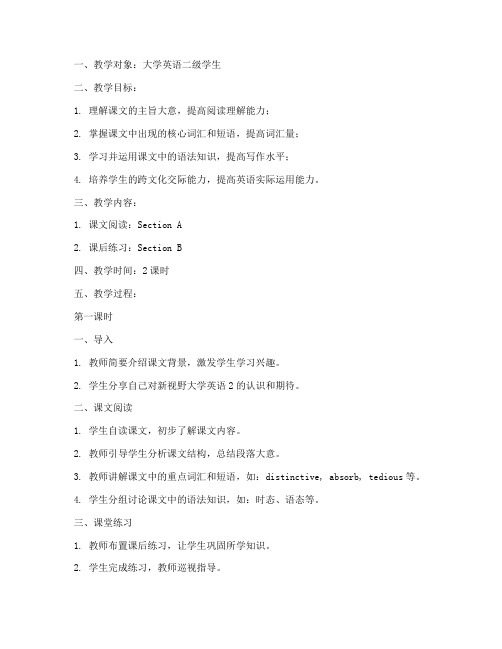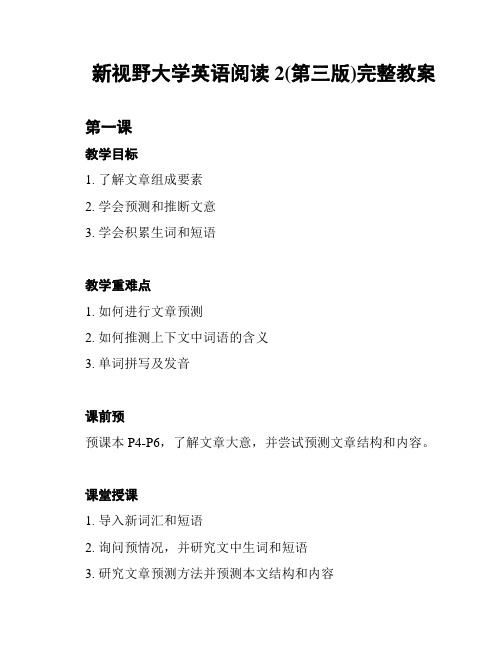大学英语二--教案
新视野大学英语第2册教案

一、教学目标1. 知识目标:(1)掌握本单元的核心词汇和短语;(2)了解本单元的篇章结构、写作特点和背景知识;(3)学会运用本单元的语法知识。
2. 能力目标:(1)提高阅读理解能力,学会从不同角度分析文章;(2)提高写作能力,能够运用所学知识写出一篇通顺的短文;(3)提高口语表达能力,能够进行简单的日常对话。
3. 情感目标:(1)激发学生对英语学习的兴趣,培养学生良好的学习习惯;(2)培养学生关注时事、关注社会的意识;(3)培养学生团队协作、相互尊重的精神。
二、教学重点与难点1. 教学重点:(1)核心词汇和短语;(2)篇章结构、写作特点和背景知识;(3)语法知识。
2. 教学难点:(1)阅读理解中的长难句;(2)写作中的篇章结构;(3)口语表达中的连贯性和准确性。
三、教学方法1. 讲授法:教师通过讲解、示范等方式,引导学生掌握本单元的核心知识和技能。
2. 讨论法:教师组织学生进行小组讨论,培养学生的合作意识和沟通能力。
3. 案例分析法:教师选取典型案例,引导学生分析问题,提高学生的实际操作能力。
4. 角色扮演法:教师设计情景,让学生进行角色扮演,提高学生的口语表达能力。
四、教学过程1. 导入新课(1)教师简要介绍本单元的背景知识;(2)引导学生回顾上一单元所学内容,为新课做好铺垫。
2. 阅读理解(1)教师引导学生阅读课文,注意关键词汇和短语;(2)学生分组讨论,分析文章结构、写作特点和背景知识;(3)教师总结讨论结果,讲解课文中的难点。
3. 词汇教学(1)教师讲解本单元的核心词汇和短语;(2)学生通过例句学习词汇用法;(3)进行词汇测试,巩固所学知识。
4. 写作训练(1)教师讲解写作技巧,引导学生进行写作;(2)学生分组讨论,互相修改作文;(3)教师点评学生作文,总结写作要点。
5. 口语表达(1)教师设计情景,让学生进行角色扮演;(2)学生分组练习,提高口语表达能力;(3)教师点评学生的口语表达,纠正错误。
新视野大学英语2读写教案

一、教学对象:大学英语二级学生二、教学目标:1. 理解课文的主旨大意,提高阅读理解能力;2. 掌握课文中出现的核心词汇和短语,提高词汇量;3. 学习并运用课文中的语法知识,提高写作水平;4. 培养学生的跨文化交际能力,提高英语实际运用能力。
三、教学内容:1. 课文阅读:Section A2. 课后练习:Section B四、教学时间:2课时五、教学过程:第一课时一、导入1. 教师简要介绍课文背景,激发学生学习兴趣。
2. 学生分享自己对新视野大学英语2的认识和期待。
二、课文阅读1. 学生自读课文,初步了解课文内容。
2. 教师引导学生分析课文结构,总结段落大意。
3. 教师讲解课文中的重点词汇和短语,如:distinctive, absorb, tedious等。
4. 学生分组讨论课文中的语法知识,如:时态、语态等。
三、课堂练习1. 教师布置课后练习,让学生巩固所学知识。
2. 学生完成练习,教师巡视指导。
第二课时一、复习导入1. 教师简要回顾上一节课的内容,检查学生的学习情况。
2. 学生分享自己在课后练习中的收获。
二、课文阅读1. 学生自读课文,进一步理解课文内容。
2. 教师引导学生分析课文中的写作手法,如:比喻、拟人等。
3. 教师讲解课文中的文化背景知识,如:美国的节日习俗等。
三、写作指导1. 教师讲解写作技巧,如:开头、结尾、段落结构等。
2. 学生根据课文内容,进行写作练习。
3. 教师对学生的写作进行点评,指出优点和不足。
四、课堂练习1. 教师布置课后练习,让学生巩固所学知识。
2. 学生完成练习,教师巡视指导。
五、总结1. 教师总结本节课的学习内容,强调重点。
2. 学生分享自己在学习过程中的心得体会。
六、课后作业1. 完成课后练习,巩固所学知识。
2. 预习下一节课的内容。
七、教学反思1. 教师对本节课的教学效果进行反思,总结经验教训。
2. 教师根据学生的反馈,调整教学策略,提高教学质量。
新视野大学英语阅读2(第三版)完整教案

新视野大学英语阅读2(第三版)完整教案
第一课
教学目标
1. 了解文章组成要素
2. 学会预测和推断文意
3. 学会积累生词和短语
教学重难点
1. 如何进行文章预测
2. 如何推测上下文中词语的含义
3. 单词拼写及发音
课前预
预课本P4-P6,了解文章大意,并尝试预测文章结构和内容。
课堂授课
1. 导入新词汇和短语
2. 询问预情况,并研究文中生词和短语
3. 研究文章预测方法并预测本文结构和内容
4. 细读文章,推测上下文词语含义
5. 汇总文章重点及难点词汇并练单词拼写和发音
课后作业
1. 完成课本P7的词汇练
2. 搜集并整理本单元的重点和难点词汇
第二课
教学目标
1. 学会通过重读和语调标出句子中的重点
2. 练用简单英语对日常活动进行描述
教学重难点
1. 句子重点的标注方法
2. 描述日常生活的基本词汇和短语
课前预
预课本P8-P10,并准备描述自己的日常活动
课堂授课
1. 导入新词汇和短语
2. 询问预情况,并进行简单日常活动描述练
3. 研究句子重点标注方法,并练标注句子重点
4. 分组练日常活动对话,并标注句子重点
课后作业
1. 练使用句子重点标注方法
2. 自行收集日常活动描述中的重点和难点词汇。
全新版大学英语第二册教案

一、课题《全新版大学英语第二册》二、教学目的1. 培养学生阅读理解能力,提高英语水平。
2. 培养学生听说能力,增强口语表达和听力理解能力。
3. 培养学生写作能力,提高写作技巧和表达能力。
4. 培养学生翻译能力,提高翻译技巧和翻译水平。
三、课型综合课四、课时2课时五、教学重点1. 阅读理解:掌握文章主旨、段落大意、细节信息。
2. 听力理解:提高听力技巧,正确理解对话和短文。
3. 写作:掌握写作技巧,提高写作水平和表达能力。
4. 翻译:掌握翻译技巧,提高翻译水平和翻译质量。
六、教学难点1. 阅读理解:理解长难句,把握文章结构。
2. 听力理解:准确理解对话和短文中的隐含意义。
3. 写作:提高写作水平,使文章结构清晰、表达流畅。
4. 翻译:提高翻译技巧,使译文准确、通顺。
七、教学过程(一)导入新课1. 教师简要介绍本节课的教学内容和目标。
2. 学生回顾上一节课所学内容,提出疑问。
(二)讲授新课1. 阅读理解(1)学生阅读课文,了解文章主旨和段落大意。
(2)教师引导学生分析文章结构,理解长难句。
(3)学生回答问题,巩固所学知识。
2. 听力理解(1)学生听录音,回答问题,提高听力技巧。
(2)教师分析听力材料,讲解听力技巧。
3. 写作(1)教师讲解写作技巧,引导学生掌握写作方法。
(2)学生进行写作练习,教师批改并给予指导。
4. 翻译(1)教师讲解翻译技巧,提高学生翻译水平。
(2)学生进行翻译练习,教师批改并给予指导。
(三)巩固练习1. 阅读理解:完成课后练习题,巩固所学知识。
2. 听力理解:听录音,回答问题,提高听力技巧。
3. 写作:完成写作练习,提高写作水平。
4. 翻译:完成翻译练习,提高翻译水平。
(四)归纳小结1. 教师总结本节课所学内容,强调重点和难点。
2. 学生回顾所学知识,提出疑问。
(五)作业布置1. 完成课后阅读练习。
2. 练习听力材料,提高听力技巧。
3. 撰写一篇短文,提高写作水平。
4. 完成翻译练习,提高翻译水平。
大学英语综合教程2unit2电子教案

一、教学课题Unit 2: Great Inventions二、教学目的1. 培养学生阅读理解能力,提高对科技发明类文章的阅读兴趣。
2. 扩大学生词汇量,掌握与科技发明相关的常用词汇和短语。
3. 提高学生的听说能力,通过角色扮演等活动,使学生能够运用所学知识进行交流。
4. 培养学生的写作能力,通过写作练习,使学生能够运用所学语法和词汇表达自己的观点。
三、课时分配1. 阅读理解:2课时2. 听力训练:1课时3. 口语表达:1课时4. 写作练习:1课时四、教学重点1. 理解文章大意,掌握文章结构。
2. 掌握与科技发明相关的词汇和短语。
3. 学会运用所学知识进行口语和书面表达。
五、教学难点1. 理解文章中的复杂句型。
2. 准确运用所学词汇和短语进行口语和书面表达。
六、教学过程第一课时:阅读理解1. 导入新课:通过展示一些科技发明图片,激发学生的兴趣,引入本节课的主题。
2. 阅读课文:学生自主阅读课文,了解文章大意,掌握文章结构。
3. 翻译练习:学生翻译文章中的重点句子,巩固词汇和语法知识。
4. 课堂讨论:针对文章中的关键问题进行讨论,加深对文章内容的理解。
第二课时:听力训练1. 导入新课:通过播放一段与科技发明相关的英语听力材料,激发学生的兴趣。
2. 听力练习:学生听录音,回答问题,提高听力理解能力。
3. 课堂讨论:针对听力材料中的关键问题进行讨论,加深对内容的理解。
第三课时:口语表达1. 导入新课:通过展示一些科技发明图片,激发学生的兴趣,引入本节课的主题。
2. 角色扮演:学生分组进行角色扮演,模拟科技发明场景,运用所学知识进行交流。
3. 课堂讨论:针对角色扮演中的问题进行讨论,提高口语表达能力。
第四课时:写作练习1. 导入新课:通过展示一些科技发明案例,激发学生的写作兴趣。
2. 写作指导:教师讲解写作技巧,指导学生如何运用所学知识进行写作。
3. 写作练习:学生根据所学知识,撰写一篇关于科技发明的短文。
新视野大学英语2 the surprising purpose of travel 课文结构分析教案

(章节、专题首页)授课教师:职称:讲师单位:外国语学院(分页)(分页)授课教师:职称:讲师单位:外国语学院Step II. Structure analysis (10 mins)1) The introduction (para 1-4)i) Brainstorm (formulaic language)A lovely dream being stolen awayA taxi being late and lostA burdensome travel My flight being canceledA long waitingMy anxietyIi) Private speaking :Ask students to remember these formulaic languages andpractice in form of private speaking to be familiar with the traditional reasons for travel although it is burdensome.2) The body (para 5-8)i) Brainstorm (formulaic language)a bit of distance help enhance creativity(Para. 6) The real purposes of travel. seasoned travelers being open to ambiguity(Para. 7) (para. 5)Creativity coming back from differences (Para. 8) Para. 6:How does a bit of distance help enhance creativity ?A bit of distance helps loosen the cognitive chains that imprison us.= Traveling to a new place can make us less controlled by familiar cognitive patterns we used to have.It makes it easier to mingle the new with the old.= we can better combine the new with the old in our thinking.Para. 7 What is the finding of the research?According to the research, the experience of an exotic culture endows us with a valuable open-mindedness, making it easier to realize that even a trivial thing can have multiple meanings.Para. 8What do we need to do to trigger our creativity?We need to try the difference by changing cultures and experiencing the disorienting diversity of human traditions.Ii) Private speaking :Ask students to remember these formulaic languages and practice in form of private speaking to be familiar with the real purposesof travel.3)The conclusion (para 5-8)Brainstorm (formulaic language)The author concludes that despite the existing drawbacks, travel can change people’s mind as well as bringing people distance and differences that are the basis of creativity.The last sentence echoes the view that distance and difference are the secret cornerstones of creativity.【设计意图】在详细分析课文结构的同时展开头脑风暴,从词汇层面向学生强调合成短语程式语和搭配短语程式语;在句子层面,向学生输入惯例性程式语,比如格言、固定的话语表达式等,并且提供学生句子框架程式语,比如要求学生背诵并使用那些为整个句子提供框架的,含有可填入参数空槽的表达句式。
新视野大学英语读写2教案
教学对象:大学英语本科二年级学生教学目标:1. 培养学生的阅读理解能力,提高学生的阅读速度和准确性。
2. 增强学生的写作能力,使学生能够运用所学词汇和语法知识进行写作。
3. 培养学生的跨文化交际意识,提高学生的文化素养。
教学内容:1. 单元一:An Impressive English Lesson1.1 阅读理解:了解英语国家的文化背景和风俗习惯。
1.2 写作训练:以英语国家文化为题材,写一篇短文。
2. 单元二:Time-Conscious Americans2.1 阅读理解:分析美国人的时间观念及其对日常生活的影响。
2.2 写作训练:以时间为主题,写一篇短文。
3. 单元三:A Visit to the Great Wall3.1 阅读理解:了解长城的历史背景和文化价值。
3.2 写作训练:以长城为主题,写一篇短文。
教学过程:一、导入1. 教师简要介绍本单元的主题和内容,激发学生的学习兴趣。
2. 学生分享自己对中国文化的了解,为后续学习做好铺垫。
二、阅读理解1. 教师引导学生阅读课文,讲解生词和短语,帮助学生理解文章大意。
2. 分组讨论,让学生就文章内容进行深入探讨,提高阅读理解能力。
三、写作训练1. 教师讲解写作技巧,指导学生如何运用所学词汇和语法知识进行写作。
2. 学生根据所学内容,完成写作任务,教师进行点评和指导。
四、课堂活动1. 学生进行角色扮演,模拟英语国家的日常生活场景,提高口语表达能力。
2. 学生分享自己的阅读心得和写作体会,促进课堂互动。
五、总结1. 教师总结本单元的学习内容,强调重点和难点。
2. 学生回顾所学知识,提出疑问,教师进行解答。
教学手段:1. 多媒体课件:展示课文内容、图片和视频,提高教学效果。
2. 小组讨论:培养学生合作精神和沟通能力。
3. 写作指导:提高学生的写作水平。
教学评价:1. 课堂参与度:观察学生在课堂上的发言和参与情况。
2. 阅读理解能力:通过课后作业和测试,了解学生的阅读理解水平。
新编大学基础英语2教案
教学对象:大学二年级学生教学目标:1. 培养学生听、说、读、写四项基本技能;2. 提高学生的英语交际能力;3. 增强学生的文化素养;4. 培养学生自主学习的能力。
教学重点:1. 听力理解:学生能够听懂日常生活中的英语对话和文章;2. 语音语调:学生能够正确发音,掌握英语语音语调;3. 语法知识:学生能够熟练运用所学语法知识;4. 阅读理解:学生能够理解文章大意,把握文章结构。
教学难点:1. 长难句的解析;2. 语法知识的灵活运用;3. 阅读速度的提高。
教学过程:一、导入(5分钟)1. 复习上节课所学内容;2. 提问学生对于英语学习的看法和困惑;3. 介绍本节课的学习目标和重点。
二、听力训练(20分钟)1. 播放一段英语对话或短文,让学生认真听;2. 针对听力材料,提问学生问题,检查他们的理解程度;3. 分析听力材料中的语音语调,帮助学生纠正发音。
三、语音语调训练(15分钟)1. 教师示范正确的发音和语调;2. 学生跟读,教师逐一纠正;3. 进行小组练习,互相纠正发音。
四、语法知识讲解(20分钟)1. 讲解本节课所学的语法知识;2. 通过例句,让学生理解语法知识的应用;3. 进行语法练习,巩固所学知识。
五、阅读理解训练(20分钟)1. 阅读一篇英语文章,理解文章大意;2. 分析文章结构,总结文章主题;3. 进行阅读练习,提高阅读速度和理解能力。
六、课堂小结(5分钟)1. 回顾本节课所学内容;2. 强调重点和难点;3. 布置课后作业。
七、课后作业1. 复习本节课所学的语法知识;2. 阅读一篇英语文章,提高阅读速度和理解能力;3. 每日进行听力训练,提高听力水平。
教学反思:1. 关注学生的学习情况,及时调整教学策略;2. 鼓励学生积极参与课堂活动,提高他们的英语交际能力;3. 关注学生的个体差异,因材施教;4. 注重培养学生的自主学习能力,提高他们的英语学习兴趣。
大学英语二travel教案
教学目标:1. 通过本节课的学习,使学生掌握有关旅行的词汇和表达方式。
2. 培养学生运用英语进行日常交流的能力。
3. 增强学生对旅行的兴趣,提高学生了解世界各地的文化。
教学重点:1. 旅行的相关词汇和表达方式。
2. 运用英语进行日常交流。
教学难点:1. 旅行的场景描述。
2. 运用英语进行旅行过程中的问答。
教学过程:一、导入1. 老师展示一些世界各地的风景图片,让学生谈谈对这些地方的了解。
2. 学生分享自己的旅行经历,激发学生对旅行的兴趣。
二、新课导入1. 老师讲解旅行的相关词汇,如:travel、tourist、hotel、attraction等。
2. 学生跟读并模仿老师,加深对词汇的记忆。
三、词汇拓展1. 老师引导学生进一步学习与旅行相关的词汇,如:plane、train、bus、ship 等。
2. 学生分组进行角色扮演,模拟旅行过程中的对话。
四、句子练习1. 老师给出一些与旅行相关的句子,让学生进行翻译和改写。
2. 学生分组进行句子接龙游戏,巩固所学句子。
五、情景模拟1. 老师设计一个旅行场景,如:在机场、酒店、景点等。
2. 学生分组进行角色扮演,运用所学词汇和表达方式进行对话。
六、总结与反思1. 老师引导学生回顾本节课所学内容,总结旅行相关词汇和表达方式。
2. 学生分享自己在角色扮演中的收获,提出自己在学习过程中遇到的问题。
七、布置作业1. 学生完成课后练习题,巩固所学词汇和表达方式。
2. 学生收集有关世界各地的风景图片,准备在下次课上分享。
教学反思:本节课通过词汇讲解、角色扮演、情景模拟等多种教学手段,使学生掌握了有关旅行的词汇和表达方式,提高了学生运用英语进行日常交流的能力。
在教学过程中,要注意以下几点:1. 注重词汇的讲解,让学生掌握旅行的基本词汇。
2. 鼓励学生积极参与课堂活动,提高他们的学习兴趣。
3. 注重情景模拟,让学生在实际运用中提高英语水平。
4. 关注学生的个体差异,因材施教,使每个学生都能在课堂上有所收获。
大学英语二2ch1_21.2.3 电子教案
在他们看来,如果不多花一定的时间来 处理某件事的话,那么这件事就好像是 无足轻重的,不值得给予适当的重视。
Section A Text Learning
Para 8
Assignments are, consequently, felt to be given added weight by the passage of time.
6. What one thinks and feels is, in the eyes of social scientists, mainly due _t_o_ tradition, habit, and education.
7. It is a real honor to have the opportunity of meeting the well-known scientist _i_n_ person.
completely ran __o_u_t__. 5. He cannot go without wine even for one day; he is a complete slave __to__ drink.
IV. Fill in each of the blanks with a suitable preposition or adverb.
to elapse: vi. (of time) pass (时间)过去,逝去 Several months elapsed before he could stand on his feet. Three years have elapsed since we last met.
to be worthy of sth: 值得 He did not write any books to be worthy of mention.
- 1、下载文档前请自行甄别文档内容的完整性,平台不提供额外的编辑、内容补充、找答案等附加服务。
- 2、"仅部分预览"的文档,不可在线预览部分如存在完整性等问题,可反馈申请退款(可完整预览的文档不适用该条件!)。
- 3、如文档侵犯您的权益,请联系客服反馈,我们会尽快为您处理(人工客服工作时间:9:00-18:30)。
Unit 1 Teaching Contents Listening & Speaking Text A Grammar Practical Writing Text B
Time week Major Fashion/Art Design Type
Lecture Periods 8 periods Teaching Objectives 1. master the basic language and skills necessary to ask for and give clarification 2. understand the main ideas of Texts A, B and C, and master the useful sentence structures and words and expressions found in the exercises relevant to the first two texts 3. grasp the basic English grammar of subject-verb agreement (1) 4. know how to write a letter of invitation 5. guess the meaning of unknown words in context (1)
Main Points 1. Get to know and use the language for asking for and giving clarification 2. Get the outline and know the main idea of texts 3. Master the use of words and expressions in texts and exercises 4. Understand the basic English grammar of subject-verb agreement 5. Be able to read a letter of invitation Difficult Points 1.Understand the difficult sentences in texts 2. Finish the exercises with grammar of subject-verb agreement 3. Be able to write a letter of invitation
Teaching Methods Task-based Ask and answer Group work
Teaching Aids Multi-media Blackboard
References
21st Century Practical College English Teacher’s Book
Listening & Speaking Periods 2 periods Teaching Procedures I. Revision Give students some tongue twister to practice oral English and review some words learnt II. Lead-in Asking students what they say when they are not clear about what has been said or have become puzzled about a particular point just mentioned III. New Lesson A. Listen to Ex.1 and fill in the blanks B. Ask students one by one to repeat the requests and reply to them using the correct responses C. Listen to the dialogue twice and fill in the blanks with the missing words D. Look for the language used to make requests and study it for a better understanding E. Either do the same with the 2nd dialogue or to be flexible with it F. Ask students to write a dialogue with a partner using the structures given in Ex.4 IV. Summary Look back on words and phrases learnt Ask questions about listening part and let students answer V. Assignment Listen to them once more after class
Text A Misunderstanding Periods 3 periods Teaching Procedures I. Revision Read words and phrases in listening part Words game II. Lead-in Have you ever had an experience in which you are misunderstood or have failed to understand others? III. New Lesson A. Let the students answer the text-related questions to identify the main idea B. Read new words in glossary C. Ask students to read them or let students lead the others read D. Analyze some difficult sentences and some language points while learning sentence by sentence E. Guide the students through the exercise F. Language Points 1. uncombed Mary’s hair was uncombed and her face unwashed as she hurried to the hospital this morning. 2. comb n. 梳子 vt. tidy, arrange or straighten (the hair, etc.) with a comb 梳(头发等) Sally combed her hair carefully. 3. get on: board (a bus, a train, a plane, etc.) 登上(公共汽车、火车、飞机等) When I got on the bus, I found all the seats were occupied. They felt worried when they realized that they had got on the wrong train. 4. head for: The ship was heading for Britain. He headed for the bus stop. 5. he could ride to New York without paying. „„他便可以不付钱就乘车去纽约。 介词without 解释为“不、未”,其后跟动词时,须用V-ing形式。 Tom was talking to his girlfriend without looking at her. He understood the meaning of the word without looking it up in a dictionary. That passenger tapped the person sitting in front of him. 那位乘客轻轻地拍了一下坐在他前面的人。 6. sitting in front of him是分词短语,作定语用,修饰the person。 课文中类似的句子还有: Every day people speaking English ask one another questions like these„ 每天都有讲英语的人相互问这样的问题„„ 7. The message was passed from person to person. 这口信通过一个又一个的乘客传下去。 注意本句中from„ to„这一结构中的名词前没有冠词。 She went from house to house asking if anyone had seen the child.
They work hard from morning to night. 8. somewhere: ad. at, in, or to a place not specified or known 在某处;在(或到)某个不确定(或不知道)的地方 They lived somewhere near London. I am sure I saw it somewhere, but I can’t remember exactly where. 9. by the time: 到„时候 The phone was ringing but by the time she got indoors, it had stopped. 10. not„ but„: 这一结构常常用来连接两个单词、词组或句子,表示“并非„而是„”的意思。 The animal you saw in this area was not a rabbit, but a wild cat. These youngsters are motivated not by a desire for success, but by fear of failure. 11. pull over: drive a vehicle to the roadside 把车开到路边 The policeman asked the driver to pull over. 12. get off: leave (a bus, a train, a plane, etc.) 下(公共汽车、火车、飞机等) Tom was seen to get off the bus near the railway station. When I got off the train at the city on the coast, I could smell the sea. 13. flight We need to hurry or we’ll miss our flight. 14. takeoff The plane crashed five minutes after takeoff. 15. „ and when he looked out his window all he could see was ocean. „„而当他向窗外望去时,他所能看到的全是大海。 all 指“所有的东西,一切”。all he could see指“他所能看到的一切”,在句中作主语。 16. ... result in highways being closed or passengers flying to the wrong continent. „„导致公路关闭或乘客飞错大陆。
